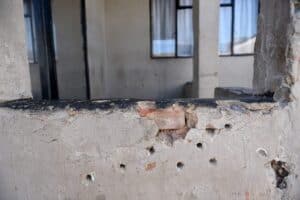Experts said the shootings were not new, and had been happening in the last five years.

The spate of mass shootings that has engulfed South Africa’s poorer communities will soon have political consequences, especially on the weakened SA Police Service (SAPS).
This is according to the University of Cape of Town criminologist Professor Irvin Kinnes, who was speaking at the Institute of Security Studies (ISS) discussions on recent shebeen and tavern killings.
Experts on the panel said the shooting and murder of groups of people were common in the country.
Between 2017 and 2020, police recorded 314 incidents where three or more people were killed in a single attack.
The violence, said Kinnes, was also in the form of attacks on families in KwaZulu-Natal and the Eastern Cape, due to family feuds and the violence in rural areas, gang violence through drive-by shootings, and organised crime violence feuds on contestation for space and resources.
He said organised crime activities such as illegal mining could have a role in the shootings.
“It could be revenge attacks against organisations such as Operation Dudula, but police investigations need to get to the bottom of this.
“These attacks are not new, they’ve been happening for the past five years. In the Western Cape, it was gang-related in the Cape Flats. The Pagad [People Against Gangsterism and Drugs] would find dead bodies all the time.”
Having finally drawn consistent media attention and police reaction, Kinnes said there were too many mass attacks from which a pattern could be drawn by investigators, including possible pre-planning by the criminals.
“You have killers who are quite comfortable in killing big groups of people and making sure they are dead. From the perspective of the killers, they must have done this before. One cannot take someone from the streets as a new member and ask them to kill 13 or 14 just like, that’s not possible.
“There is a measure of pre-planning in some of these attacks…there could be prior surveillance of the establishments attacked.”
ALSO READ: Tavern shootings: There is no law in South Africa
‘Watershed moment’
With crime intelligence unable to prevent such attacks, and a lack of a good detective service, the SAPS has to find a new forum to partner with communities, Kinnes said. There is low trust in the police as communities fear reprisal from criminals and won’t engage authorities to provide information.
He added that the violence has brought a watershed moment for the State.
“I do think it’s a watershed moment when we have so many of these attacks so soon after one other and in separate provinces…this appears to be a pattern that’s also sending a message… and someone ought to respond to that particular message.
“I don’t think the SAPS in its current state is able to draw patterns in terms of intelligence and respond, there has to be a bigger team, and police have to open up to accept assistance in understanding what’s happening and with capacity.
Overstretched officers have to respond to multiple incidents such as community protests and recurring threats of the repeat of last year’s violent unrest.
For communities, the spate of shootings provided an opportunity to consider whether it was time to work with the police outside of community policing forums ( CPF), Kinnes said.
“I think it’s time for reviewing approaches, I think the CPFs have outlived their usefulness, we need new forums with police. Officers are inundated around the country.
“When you have people who undermine governance, safety and police work, it shows there is lawlessness…it shows people are confident to kill large groups of people and this will have political consequences,” Kinnes said.
Dr Guy Lamb, also a criminologist at the Department of Political Science at Stellenbosch University, asserted that the question as to who benefits from the tavern and shebeen shootings should be answered.
READ MORE: NFP calls for referendum on death penalty following mass shootings
The attacks were taking place at vulnerable and informal businesses in poorer communities, where police efficiency is lacking, he said.
“Taverns are vulnerable to crimes such as extortion, where bribes are extorted out of them. We do need to ask who benefits from these shootings. Is this competition from different groups?
“We also need to look into what Covid and lockdown did to social relations in certain communities. We know that it has had a massive effect on the economy – the cost of living, and job losses. What has Covid done to make life more difficult in the common economy?
“It has seemingly exacerbated competition leading to extortion and to more violence. This is playing out in the Western Cape, where different actors are competing with each other and violence seems to be the only way to mediate that.”
According to ISS head of the justice and violence prevention programme Gareth Newham, in the past decade, the police’s ability to detect or solve murder cases dropped by more than 50%.
“In 2021, the detection rate for murder stood at 15%, meaning 85% of murder cases are not solved. This opens up space for murder to be a relatively risk-free tool for those people and groups that wish to engage in it.”
NOW READ: Tavern shootings: Calls grow for police to step up






